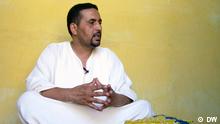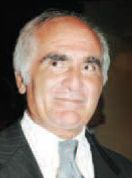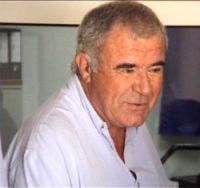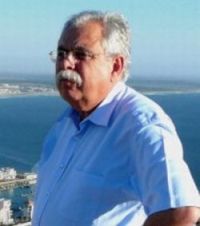By Karlos Zurutuza

The Western Saharwi football team. Credit: Karlos Zurutuza/IPS
RABUNI CAMP, Western Algeria, Jun 25 2012 (IPS) - The football teams are back in their refugee camps in Algeria, and no, FIFA has taken no note of this tournament. And the television cameras are all at the Euro cup.
These boys played well enough, even if nobody was around to watch. “They would slip in the first matches but this is understandable because they had never ever played football on grass before,” Mohamed Sid Ahmed Bugleida, sports director of the Sahrawi ministry of youth and sports tells IPS. Few know of this ministry in the Western Sahara, let alone of the tournament.
The Western Sahara football team he manages has just returned from Iraqi Kurdistan after taking part in the fourth tournament of the Nouvelle Fédération-Board (NFB). Also known unofficially as the Non-FIFA-Board, this is a football association established in December 2003.
It is made up of teams that represent nations, dependencies, minorities, unrecognised states, stateless peoples, regions and ‘micronations’ not affiliated to FIFA. But it does seek to work with FIFA to acquire membership for its teams eventually.
The politics of dispossession hangs over this Cup. Western Sahara became victim of a decolonisation process interrupted in 1976 when Spain – its former colonial power – left the territory in the hands of Morocco and Mauritania. Morocco now controls almost all the territory, larger than the size of Britain, except for the largely uninhabited and economically useless desert portion.
Today, the vast majority of the Sahrawi population – of between 200,000-250,000 according to UN sources – lives in refugee camps in the Tinduf region in Western Algeria in the Sahara.
“We faced several problems in displaying our flag due to Moroccan pressure on the Kurdish regional government. We were at loggerheads with the local authorities but the Kurdish audience openly expressed their solidarity and warmth,” adds Bugleida from his office in the building of the Ministry of Youth and Sports in Rabuni refugee camp in Western Algeria. At its entrance, a plaque thanks the town of Granadilla (Tenerife, Spain) for its “generous aid”.
In a room nearby, the 20 players from the Saharawi squad in their green tracksuits with the initials SADR (Saharawi Arab Democratic Republic) on their backs, are celebrating with Algerian biscuits and instant coffee after their return from the tournament earlier this month.
Player Cori Maaruf, 26, cannot hide his joy. “I am proud to have written a page in the history of our people,” he tells IPS. “It’s the first time we attended such a tournament but we achieved fourth place among a total of nine teams.“And take into account that we only trained for five days before the tournament, and always on sand. There are no proper football grounds here in the refugee camps.”
Salah Ahmed, with three goals to his credit, is the top scorer in the local squad. He scored against other non-nations: two against Darfur and one against Occitania, a culturally homogeneous region in southern Europe across France and Italy.
“Whether one day we can play on behalf of a fully recognised sovereign state depends only on god’s will,” says this 24-year-old born in the Dajla refugee camp 170 kilometres southeast of Rabuni. Until then, he says he will carry the Saharawi national flag with pride wherever he goes.
“Much more important than any sport result is to show the world that we exist, that there is nation called Western Sahara that struggles to survive after decades of unfair and brutal occupation,” says Said Saleh, a 21-year-old footballer after his second trip outside the refugee camps.
The first, he says, was to Spain after he was invited by a family in Madrid. After the abduction of three aid workers – two Spaniards and one Italian – in the Western Sahara seven months ago, and the financial crisis in the Eurozone, the number of summer visits to Spain have declined, together with international aid to the refugees.
These young players have only recently started to represent their people in football stadiums. But the Polisario Front, outlawed in the Morocco-controlled part of Western Sahara, is recognised by the UN as the legitimate representative of the Western Sahrawis since 1979. Polisario officials expressed concern to IPS over diminishing aid over in the last few months.
Mohamed Molud, minister of youth and sports, stresses the strong encouragement the squad brings to the young in a difficult environment. “It’s far from easy to generate any enthusiasm towards sports in this environment and with a total lack of resources.”
Renting a proper football ground from the Algerian government, and organising matches against local teams, or even neighbouring countries such as Mauritania, are some of the proposals being considered.
For the time being, both staff and players look forward to the next NFB tournament in 2014. There were no surprises in the 2012 tournament: the cup stayed in Kurdistan – four of their players also play for the Iraqi national team.
(END)


















 Late King Hassan II of Morocco occupied Western Sahara under UN condemnation. Now his son, Mohamed VI (photo), profits from agriculture there.
Late King Hassan II of Morocco occupied Western Sahara under UN condemnation. Now his son, Mohamed VI (photo), profits from agriculture there. Mohamed Tazi, important Moroccan businessman farming agricultural products for European market
Mohamed Tazi, important Moroccan businessman farming agricultural products for European market The experience of Pierrick Puech, who was behind Azura, was key also for the Idyl start-up
The experience of Pierrick Puech, who was behind Azura, was key also for the Idyl start-up The mayor of Agadir, Morocco, profits from agriculture in the occupied Western Sahara
The mayor of Agadir, Morocco, profits from agriculture in the occupied Western Sahara